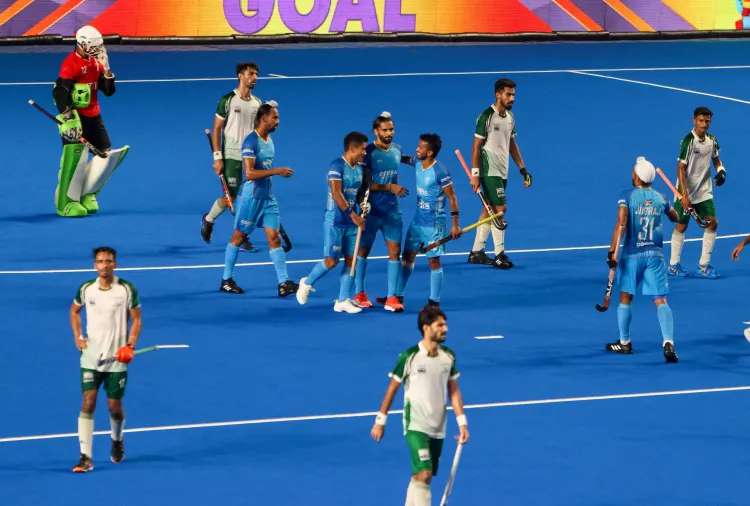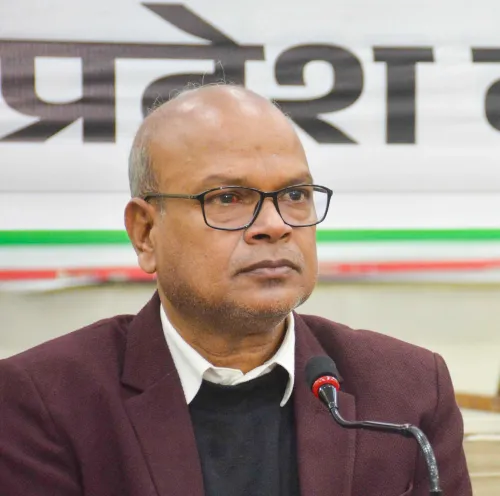Could Denying Visas to the Pakistan Team for Asia Cup Hockey Lead to IOC Sanctions?

Synopsis
Key Takeaways
- Denying visas may lead to IOC sanctions.
- The Olympic Charter prohibits discrimination based on nationality.
- India has faced previous IOC sanctions for similar issues.
- International sporting bodies expect compliance with visa regulations.
- Future hosting rights could be at stake for India.
Mumbai, July 4 (NationPress) The Indian government is facing mounting pressure regarding its choice to allow the men's hockey team from Pakistan to compete in the upcoming Asia Cup scheduled to take place in Rajgir, Bihar. Numerous individuals, including both current and former sports officials, have called on the government to withdraw its decision and deny the Pakistan team visas for their visit to India.
It is evident that attempts to overlook the ramifications of barring a team from participation due to political motives—an act that contradicts the Olympic Charter—will have lasting effects on the host country's ability to organize future sporting events.
Critics of the decision to permit the Pakistan team to enter the country for an FIH Grade C event like the Asia Cup may not recognize that such actions could be deemed significant interference by the International Olympic Committee (IOC). This could complicate the Indian Olympic Association (IOA)’s discussions about hosting the 2036 Olympics.
However, they overlook a crucial fact: back in 2019, the IOC had urged international federations to reconsider giving hosting rights to India after visas were denied to boxers from Kosovo and Pakistani shooters who were set to compete in events held in India.
This led to the IOC Executive Board revoking the Olympic qualification status for a specific event (the men's 25-meter Rapid Fire Pistol) and advising against hosting global events in India.
Denying visas to the Pakistan men's hockey team for the upcoming Asia Cup in Rajgir would mark India's third violation of allowing participation based on political considerations, potentially incurring penalties even stricter than those faced previously.
In this context, it is essential to examine what the IOC Charter states regarding participation denial based on political reasons.
The Olympic Charter asserts that every individual must have the right to practice sport without any form of discrimination, aligning with internationally recognized human rights. Consequently, denying visas for political reasons contravenes the Olympic Charter. Thus, if Pakistan players are denied visas to participate in the Asia Cup, it may jeopardize India's future hosting rights and tarnish its global reputation in sports, according to sources within the Ministry of Youth Affairs and Sports.
The Charter also forbids discrimination based on nationality, ensuring that all qualified athletes can take part in international competitions, irrespective of political relations. It emphasizes the autonomy of sports federations from political influence. Denying visas for political reasons undermines this principle.
Supporters of the government's stance on the Asia Cup also reference international precedents, notably two instances that resulted in IOC sanctions against India several years ago.
India previously denied visas to athletes from Kosovo, a newly formed nation that the country does not recognize, for their participation in the World Boxing Championship 2018. Additionally, in 2019, two athletes and one official from Pakistan were denied visas for the ISSF Rifle/Pistol World Cup.
This prompted the IOC, in a letter dated 21.2.2019, to notify the IOA that the IOC Executive Board decided to suspend all dialogues with the Indian NOC and Government concerning potential applications for hosting future events and Olympic-related events in India until the Indian Government provided clear written guarantees ensuring the entry of all participants in full compliance with the Olympic Charter.
Moreover, it recommended that international federations refrain from awarding or conducting sports events in India until these guarantees were secured. The Indian government eventually had to provide written assurances to the IOC for the recommendation to be lifted.
Other nations have also faced sanctions on similar grounds, such as Malaysia losing the right to host the 2019 World Para Swimming Championships due to visa denials for Israeli athletes, prompting the IPC to transfer the event to London.
The United Arab Emirates denied Israeli tennis player Shahar Peer visas to compete in the 2009 Dubai Tennis Championships, resulting in a fine from the WTA and a requirement for future compliance. The subsequent year, the visas were granted following international pressure.
These instances and principles illustrate that global sports organizations expect host nations to provide visas to all eligible athletes, regardless of political frictions. Denying visas for political reasons contradicts the Olympic Charter and international sporting standards, leading to possible sanctions or loss of hosting privileges.
If India commits this infraction for the third consecutive time, it will undoubtedly affect its ongoing “continued dialogue” with the IOC Future Rights Commission regarding hosting rights for the 2036 Olympic Games planned for Hyderabad.










